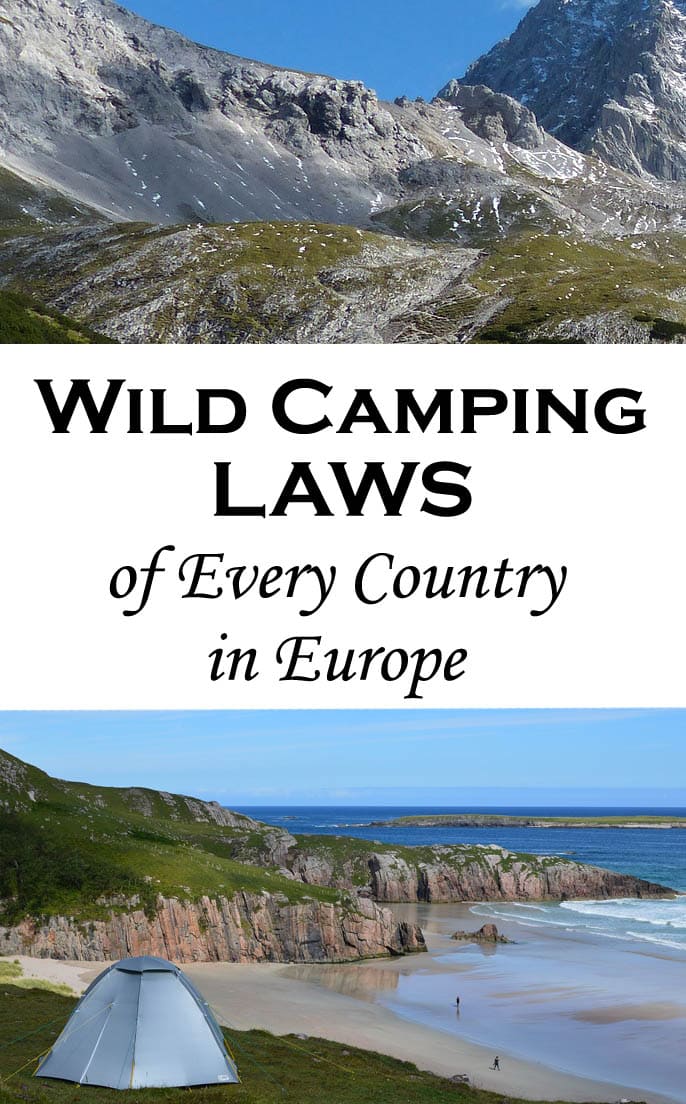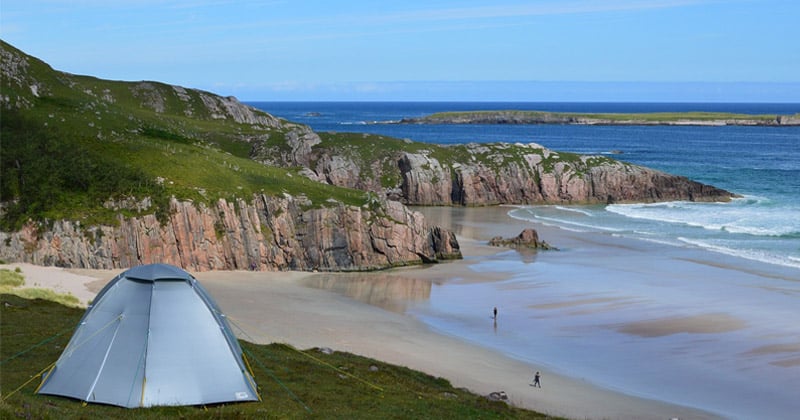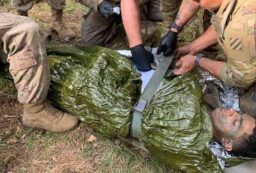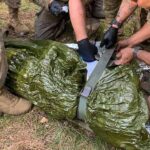I love wild camping in Europe, but had yet to find a complete list of wild camping laws for every country. So, I decided to make one.
Let me just preface this by saying that paid campgrounds definitely have their place. Campgrounds are great for people who are just getting started with camping and don’t have a water filter or know basics like how to poop in the woods. And there was that time I got sick while wild camping. I was happy to have a paid campground to go to where I could puke in a proper toilet.
With that said, I firmly believe that wild camping beats campgrounds.
Aside from the fact that wild camping is free (and thus makes the outdoors more accessible to everyone), it also means that you’ve got a chance to completely disconnect, get away from the crowds, and don’t have to worry about annoying camping neighbors blasting music as they get drunk all night…
I am lucky enough to live in the Balkans where wild camping is legal in most countries. For any of you who are in Europe or want to visit, here is a list of the wild camping laws of every country in Europe.
*Just because wild camping is “illegal” in some countries, it doesn’t mean that you shouldn’t do it. I know many travelers who have wild camped all over the place (including not-so-wild places like city parks). If you are discreet and respectful, no one is likely to bother you. Even if the police do come, they will probably just tell you to leave. I’m sure some people have gotten fined, but I don’t know of any. So, it is up to you to decide whether the risk of getting a fine is going to detract you from trying wild camping!
Not sure what to eat on your trip? I’ve written an eBook with over 50 dehydrator recipes for serious camping. Just add water and you’ve got yourself a gourmet meal!!
Because you are wild campers, I’ll give you a discount. Buy the eBook for 50% off here. 🙂

This pumpkin quinoa chili only weighs 3oz for a 330 calorie serving.
Albania
Albanians have a habit of ignoring traffic laws, smoking regulations, and pretty much any rule. So, if there is a wild camping law on the book, no one is paying any attention to it. The country is full of wild places where you can easily camp. I personally have wild camped in Albania a few times and loved it (my favorite country for camping). The only time you might have trouble finding a wild camping spot is on the beach in the summer. I recommend Gjipe Beach.
Andorra
Wild camping is illegal in Andorra. It is only allowed around a hut during the night when the hut is full.
Armenia
Wild camping is legal in Armenia. Locals tend to be very hospitable and curious, so be prepared for some locals to come check out your tent and invite you home for coffee. There is plenty of wild land in remote areas – but beware of wolves and animals! Stray dogs can be a problem in the countryside.
Austria
Wild camping in Austria is not legal. However, if you are in unprotected forest (not in a National Park or reserve), you may set up a “planned bivouac” for one night. So, tents are not permitted nor are bivvy sacks for more than one night. You can read more on the topic here.
Belarus
The country’s constitution states that all forest and farm lands are publicly owned, thus you are able to wild camp legally. Apparently 40% of the country is covered by forest, so there are plenty of places for wild camping!
In remote and less populated Northern districts of Belarus the wild camping is especially convenient, as there’re numerous lakes, with quiet and uncrowded camping spots and beaches. Fishing is popular there, so almost every lake has a nice spot somewhere on the shore suitable for wild camping.
Beware of forest fires, which are quite common in Belarus. In case of fire danger it’s illegal to enter the forest, and many forest tracks are blocked by officials. The real-time map of such restrictions is found here: http://www.mlh.by/maps/map.php
Belgium
There isn’t much forest or nature in Belgium, so it is no surprise that wild camping is illegal. However, there is a “hidden route” where pole camping is allowed. You can find more info here.
Bosnia and Herzegovina
Wild camping is legal. However, there are still a lot of landmines buried in Bosnia. Never camp on land which has obviously not been tended in a long time. And obviously never camp on land surrounded by those “Beware of Mines” signs!
Bulgaria
I’ve read conflicted information about whether wild camping is legal or illegal in Bulgaria. Even if it is officially illegal, wild camping is still very tolerated. Speaking from experience, locals are very hospitable and I even had locals drive me to a wild camping spot in a cave and then come back later to bring me chocolate. 🙂
Croatia
Croatians live off of tourism, especially on the coast. So, be prepared to find big “No Camping” signs all over the place. However, just because the laws state otherwise, it is still perfectly possible to find remote places in Croatia for wild camping – just be discreet!
Cyprus
I couldn’t find out the legal status for wild camping in Cyprus. However, I was told by a local that you can wild camp all around the island so long as it is not in a protected area (I’m assuming he didn’t mean 10 meters from a beach-front hotel though). Apparently, the worst that can happen is that a forest ranger will come and ask you to leave. What Cyprus IS really strict about is fires. If you light a fire, expect to get a 600 euro fine!
Czech Republic
Czech basically have the same wild camping laws as Austria. It is permitted – but only in unrestricted areas for 1 night and without a tent.
Denmark
In Denmark, wild camping is NOT legal. If you are caught camping outside of a campground, expect to pay fines. However, there are some places where you can “pole camp” legally. You can find a map here.
Estonia
Estonia has great public access laws. Wild camping is permitted on government lands (called Riigimets) – though some National Parks might have restrictions. There is a big culture of wild camping and you shouldn’t have any problems from locals. Note that the National Forest Center (RMK) has many official campsites which even have latrines, so you don’t even have to camp wild to camp free.
Finland
Finland (like most Nordic countries) has liberal public access laws, as well as most Nordic countries, though there may be restrictions in certain areas.
You are allowed to wild camp outside the towns and public beaches without permission, so long as you don’t cause disturbance to the land owner. In practice this means that you need to stay a suitable distance from homes and cabins, shall not be seen by others, and you shall not stay on one place for more than couple of days. Wild campfires are forbidden.
Exclusions:
The exclusion of this rule is camping within or near the Laavu or Kota shelters scattered throughout the country, which are usually equipped with toilet, fireplace and firewood. (But presence of water source isn’t always guaranteed.) There the short-term camping (up to a couple of days on one place) is completely legal and encouraged. The GPX coordinates of such shelters can be downloaded here: http://laavu.org
In the province of Aland, the right to wild camp isn’t recognized. As a rule you shall ask the permission from the land owner. Also the fresh water sources are quite scarce on islands, so you’d better consider the official campsites.
France
Wild camping in France is regulated under Articles R111-32, R111-33 and R111-34. You can click the links to read the laws. They are written in French and, even if you speak the language, are pretty confusing. Here’s the gist of what you need to know:
The wild camping laws in France are mostly designed to prevent long-term camping and caravans. You will NOT be able to go somewhere and set up a multi-day camp (or a single-day camp with a big tent, chairs, table, etc.).
However, camping that is done as part of a backpacking trip is generally allowed. Thus, France basically invented a term for this: bivouac.
Bivouac refers to campers who are just staying overnight, usually as part of a trek and with just a small tent. Of course, you are expected to Leave No Trace. Bivouac camping doesn’t necessarily mean you have to stay in a bivy bag though.
Even this type of wild camping isn’t always going to be allowed though. Here are some guidelines if you want to wild camp without problems in France:
- Check regulations when going to regional or national parks. Each park has its own rules and they will be enforced! More on France’s national park rules here.
- Don’t camp if there’s a “No Camping” sign up: The sign was put up for a reason and the rule will probably be enforced.
- Be very discreet! Stay away from main roads, paid campgrounds, and popular attractions. Definitely stay away from historic sites.
- Ask permission when camping on someone’s land.
- Don’t make a fire. If you must, keep it small and be very safe.
- When in doubt, pitch the tent at dusk and take it down immediately in the morning.
This website has good information about bivouac camping in France, including a map of France’s national and regional parks along with info about their camping rules.
Georgia
Wild camping is legal and you will find plenty of very remote places for camping. I personally have never wild camped in Georgia, but I heard that you should avoid camping near flocks of sheep because the sheep are guarded by aggressive dogs!
Germany
Wild camping is illegal in Germany. You are allowed to sleep one night in a bivvy sack outside of private property and not on nature reserves or restricted areas. You might be able to wild camp with a tarp tent. However, whether that counts as a tent is up to the discretion of whoever found you. Be warned that anti-camping laws are actually enforced!!!
Greece
Wild camping is illegal in Greece. However, wild camping is tolerated in many areas. In the mountains (not in a National Park), for example, you should not have a problem. The hardest part is trying to find a wild camping spot on the beach because so much beach property is owned by hotels and overridden with tourists.
Hungary
I found conflicting information about whether wild camping is illegal or legal in Hungary. However, I personally have wild camped in Hungary a couple of times and never had any problems. Just note that there aren’t too many wild places in Hungary. You’ll probably be near villages. Either ask for permission or go somewhere really hidden.
Iceland
According to the Visit Iceland website, wild camping is legal if you find yourself away from registered campsites. In residential areas, you are allowed to pitch up to three tents on uncultivated land for one night only. In the highlands, you can pitch as many tents as you want and there are no listed restrictions for how long you can camp. Note that these laws only apply to tents and not to RVs or caravans.
Ireland
Wild camping in Ireland is not legal. Most land is privately owned and expect a lot of fences, walls, and locked gates. In remote places, however, wild camping is tolerated – such as for cyclists going long distances.
Italy
Wild camping is illegal in Italy. It apparently isn’t very well tolerated, though you might be able to find some places north of Rome and in the South where you can get away with it.
Kosovo
Wild camping is legal in Kosovo and very well tolerated. Locals are hospitable and the nature is gorgeous! I recommend visiting Rugova Gorge.
Latvia
Latvia has great public access laws. You are allowed to wild camp, so long as you are outside of designated protected areas.
Liechtenstein
Wild camping is illegal. You could try wild camping in one of their banks though and see how they like it 😉
Lithuania
Like with other Baltic countries, wild camping is legal and even encouraged.
Luxembourg
Wild camping is illegal and strictly enforced (no surprise here).
Macedonia
I read that wild camping is illegal in Macedonia (not so sure if the source is correct though). Even if it is illegal, wild camping is well tolerated and you won’t have a hard time finding remote areas. Like elsewhere in the Balkans, locals are also very hospitable. However, due to recent animosity towards refugees, you might want to be careful about wild camping near the border — especially if you have dark skin and might be mistaken for a refugee. Yeah, racism sucks. 🙁
Malta
Not only is wild camping illegal in Malta, but camping in general is not encouraged. There are only a couple official campsites on the island. However, according to this article from Air Malta, you can get special permission from the local council where you want to go to wild camp.
An old article from Livinginmalta.com (unfortunately no longer live) has some better info. The article basically said that wild camping is illegal, but you can still do it:
“On the Maltese islands there are several locations to camp out. The Ta’ Cenc area close to the village of Sannat in Gozo is a protected site, but often you will see tents pitched high on the cliffs. L’ Ahrax peninsula in the north of Malta has many spots ideal for pitching a tent, with lots of shaded woodland. The area beyond Bahrija in the west of Malta is quite remote and has some impressive bays and dramatic scenery. The island of Comino is virtually uninhabited and provides many opportunities for getting away it all, and as previously mentioned, there are basic facilities at one of the sandy bays. It’s not possible to camp just anywhere in Malta, and you will need to look out for signs, but in the more remote areas, pitching a tent in the wild is quite easy.”
Moldova
I can’t find any info about whether wild camping is officially legal or not, but sources do say that wild camping in Moldova is tolerated.
Montenegro
Wild camping is technically illegal in Montenegro (or at least that is what I read). However, outside of National Parks, touristy areas, and the beach, you will have no problem wild camping. I am speaking from experience! 🙂
Netherlands
Wild camping is illegal in the Netherlands. However, the Forestry Commission has established a system of “legal wild camping” using pole camping. You can read more about wild camping in the Netherlands here.
Norway
Wild camping in Norway isn’t just legal, it is encouraged. The country has one of the most liberal public-access laws and a culture which believes in man’s right to nature. Under the law, you are allowed to wild camp for up to two nights on uncultivated land no closer than 150 meters from a house or a cabin. That means land which is not tilled or in use (such as for crops or farm houses). In mountainous areas, you are allowed to wild camp legally for longer.
Poland
Wild camping in Poland is illegal. You are probably thinking of the Tatra and Karkonosze Mountains if you want to wild camp. Unfortunately, those mountains are very crowded and there is a good chance you will get caught if you wild camp there. You aren’t even allowed off the paths at those mountains. However, you might be able to find secluded places in other parts of Poland (outside of National Parks) where you could get away with wild camping.
Portugal
Wild camping is illegal in Portugal. However, outside of the summer (and away from touristy places), you can apparently get away with wild camping. It’s a bit of a grey area.
Romania
Wild camping is illegal in Romania, but it is widely tolerated and you shouldn’t have any problems – especially outside of reserves. Apparently, the worst that is going to happen is that some forest rangers might ask you to move or pay a small fee (like 2-3 euros) for camping. Campfires are illegal, but also not enforced.
Russia
Wild camping is legal in Russia, except on church lands, private lands, and near water reservoirs. I was told by a local that there is a “Federal Law granting free unmotorized access and camping within 20 meters from waterline of almost all lakes, rivers, and seas. Even the private land owner cannot legally claim this 20-meter strip (unfortunately they do it illegally quite often). The only exception is a handful of lakes which are surrounded by private lands, but it’s extremely rare case. The private land is always recognized by a tall wall, so you cannot mistake it. Also the nature reserves may have their own rules regarding the camping (like in the rest of the world).
The campfires are generally allowed (as well as getting the firewood for personal campfire), except for the hottest months, when there is severe risk of fires. But most people disobey these restrictions, which are not enforced, except for in nature reserves.”
Serbia
There aren’t any laws about wild camping. If there are, they aren’t being enforced. :p The only times you might have problems wild camping in Serbia is if you are in a National Park or Reserve. Camping is usually forbidden there.
Note that Serbians are very hospitable. If they see you wild camping or you ask to camp in their field, they will probably invite you inside.
Slovakia
Wild camping in Slovakia is legal. However, it is illegal in areas with a level 3 protection and above (meaning you can’t wild camp in the High Tatras or national parks). You also aren’t allowed to wild camp in forests – but “forests” is defined by the map, not presence of trees. I was told that wild camping in forests (even ones marked on the maps) is tolerated. Be careful about making a fire though – that is generally prohibited.
Slovenia
Wild camping is technically forbidden in Slovenia, but it is widely practiced and tolerated. However, you probably shouldn’t try to wild camp in the popular places (such as Lake Bled, Bohinj, and Triglav park). In those places, you could end up with a fine.
Spain
Wild camping in Spain is complicated. There is a “mother law” Article 46.1 of the order for July 28th which states that:
“Apart from tourist camp sites no more than three tents of caravans may be placed at the same location, nor should there be more then 10 campers, nor may the camp be in place for more than three days. Tents and (caravans) within 500 meters of each other are considered to be part of the same group.”
The law also states that it is prohibited to free camp within 200 meters of the sea, within a few kilometers of military installations, within a few kilometers of a regular camp site, and in protected areas like national parks, natural parks, bird sanctuaries called ‘ZEPA’s, (Zona Excepcional de Protección de Avifauna), etc.
However, there is the new law under the Spanish Constitution of 1978, which created seventeen ‘autonomous regions’ each with considerable, though varying, powers to make their own legal codes with their own territory.
Under these new laws, wild camping in Spain is COMPLETELY PROHIBITED in: Andalucía, Aragón, Asturias, Extremadura, Galicia, Navarra, Valencia
These areas have their own laws/permit requirements for wild camping: Cantabria, Murcia, La Rioja.
These areas fall under national rules and wild camping IS permitted: Basque Country, Cataluña, Madrid, Castilla y León, Castilla la Mancha. But in these areas you still can’t camp near the beach, in national parks, protected areas, etc. Also, a lot of the land is privately owned, so you’d have a hard time finding anywhere that would even fall into the permitted wild camping areas.
You can read more about wild camping in Spain here. In the linked article, it says that the fine for illegal camping is 30 euros per square meter of space used, per day.
If you are just looking for a place to camp for free but not necessarily wild, this article has recommendations.
I’d avoid making a fire while wild camping in Spain. The locals might turn a blind eye to wild campers in some areas, but the risk of forest fire is very real and the fire will likely quickly attract police! And the fines for illegal fires can be very steep – €3,000 in some areas.
Sweden
Wild camping is permitted. In fact, Swedes are quite proud of their rules which state “don’t disturb, don’t destroy” and “freedom under responsibility”.
You are allowed to leave your tent up for 2 days. Campfires are permitted, but only if there isn’t a fire prohibition in place, and the fire is “under control” and “suitable equipment” is used. To see if there is a fire prohibition in place, you’ll need to check with Länsstyrelsen. There is also an app “Brandrisk Ute” that you can use to check if fire restrictions are in place – just use the map feature to see.
Switzerland
Wild camping in Switzerland is a bit of a gray zone. While it is technically forbidden, it is tolerated in remote, wide-open places. In some places though, the police are stricter – especially about camping along rivers, lakes, and reservoirs. Apparently the best practice is to ask the local police first if it is okay for you to wild camp.
Turkey
There is conflicting information about whether wild camping in Turkey is legal or not. If it is illegal though, the law is definitely not enforced. You won’t have a problem camping pretty much anywhere in Turkey — even along roads and populated areas. Obviously though, you’ll want to avoid any touristy areas like beach resorts (or be very stealth!). Also, I’d avoid making a campfire in many areas since the risk of wildfires is often high. Making a campfire could get you in trouble.
Ukraine
Wild camping in Ukraine is legal, though some national parks only allow camping in designated areas. Even these rules apparently aren’t strictly enforced. Just note that you might need special permission to camp near border areas. You don’t want border control to mistake you for a smuggler!
United Kingdom (UK)
England and Wales
Wild camping is England and Wales is illegal almost everywhere, unless you have a special permission. The exception is Dartmoor where the camping rights are written into the National Parks & Access to the Countryside Act. However, wild camping is tolerated in some areas of England. Read more about wild camping in England here.
Northern Ireland
There are major issues with accessing land in Northern Ireland since most of it is privately owned – even the hiking trails up popular mountains. Basically, you have to ask permission to even hike nevertheless camp. Here is what I found:
‘Wild camping is only permitted in Northern Ireland with the landowner’s formal or tacit approval. There are no rights as exist elsewhere in Europe’ explains Ross Millar of the Countryside Access and Activities Network (CAAN). ‘In areas well used for hill walking, such as the Mourne Mountains, wild camping is relatively common but most of this is done on public land (Forest Service or Northern Ireland Water, a publically owned body) or lands which are in ‘commonage’. On purely private land, whilst strictly speaking permission should be gained from the owner, it is less common but largely tolerated. However, one problem that does exist in the Mournes is that due to their accessibility a lot of ‘wild camping’ is by youths who often leave considerable litter and damage. Discreet camping rarely causes any issues.’
Scotland
Wild camping is legal in Scotland under the Land Reform Act of 2003. You can basically wild camp anywhere. However, do note that there are some exceptions. For example, it is not permitted to wild camp on the island of Tiree in the Inner Hebrides and East Loch Lomond. Do your research before you go!
*I did my best to research all of these laws. If I made a mistake, please let me know so I can fix it! And, of course, remember to be responsible and practice Leave No Trace whenever wild camping.
Pin it!














34 Comments
Marina
November 2, 2018 at 4:42 pmThank you for the great guide!
I would like to add about camping in Ukraine, that although it is legal, it is better to camp on the good distance from the villages, and hiding somewhere in the forest, to avoid the unwanted attention of the locals. If you camp somewhere not high in the mountains, take care of your stuff and pack all the valuables inside the tent.
Diane
November 9, 2018 at 1:51 pmThanks for the tips! I’m also always worried about gear getting stolen when I camp near villages/civilization. I bring my “expensive” smaller gear with me, like my knives and headlamps. Have never had a problem though!
Max
December 22, 2018 at 11:03 pmEmergency biohacking (without a tent) in Switzerland is always allowed. Camping (with a tent) is fine above the tree line. Camping is explicitly prohibited in nature parks, nature protection areas, wildlife protection areas, zones where hunting is prohibited. The laws are all about protecting wildlife. Basically the more sensitive the ecosystem is, the more you are expected to take extra care, or the more prohibited it is.
The laws can also be different in each canton.
Here’s a PDF in German that explains it:
https://www.sac-cas.ch/fileadmin/Umwelt/Naturvertr%C3%A4glicher_Bergsport/Campieren___Biwakieren/SAC-umwelt-campieren-biwakieren-flyer-2018.pdf
Diane
December 24, 2018 at 2:15 pmThanks for the info and the link!!!
Name *
January 11, 2019 at 1:33 pmLet me please, to give som info about the wild camping in Hungary. Firts of all, it is not prohibited, but it is restricted. For NO MORE than 24 hours, you are allowed to camp anywhere in the forests and along the riverside. Next day you have to move and have to keep the area as you’ve found it (so, you have to clean your garbage and so on). By other words: if you want to roam in the wild in Hungary, sleeping at other places day-by-day, it is ALLOWED. If you want to pass more than a day in the wild at the SAME place, that is not allowed. That’s all.
Adam
March 28, 2019 at 11:48 amLittle addition:
In nature reserve areas and national parks it is required to get the permission of the park authorities to wild camp but in the case of one or two tents (1-4 people) rangers and foresters usually are tolerant even if you do not have any permission as long as you follow the no trace rules.
Staying in one place for more than 24 hours (outside of the mentioned areas) is not really illegal but always depending on the permit of the local forestry service.
Name *
January 16, 2019 at 12:18 pmHello all! I would like to put some update on Czech Republic wild camping. It is prohibited in national parks (but for example in Sumava there is possibility to use temporary overnight camp, link with map: http://www.npsumava.cz/en/3336/sekce/temporary-overnight-camp-sites/). Outside national parks there are basically same rules as for Hungary, you can stay for one night without fire and than you should move to another place. I was wild camping there many times and never was problem. Usually was not problem to find some more hidden place.
Diane
January 17, 2019 at 11:36 amThanks for the update! 🙂
Name *
March 5, 2019 at 4:10 pmHi, I can confirm, I come from Czech Rep., now living in Austria and the camping rules are not at all alike.
In Czech you are allowed to camp in unprotected areas on public land, no fire allowed in the woods, etc. But we practice wild camping even with rather large groups of children, never had any problems…
Name *
January 21, 2019 at 10:45 pmI read somewhere that wild camping is allowed in the French Pyrenees if staying over 2.000m, which is what I did and what the guardian of a refugee nearby confirmed to me. Not sure if this applies in the Alps.
Regarding Spain, I confirm that what you wrote about Aragon is (sadly) completely true.
Svetlozar
January 22, 2019 at 9:01 pmWild camping in Bulgaria is LEGAL. There were some attempts a while back to make it illegal, but they failed. There’s no regulation prohibiting it. There are some restrictions in national parks and they vary from park to park. If you do it in a discreet and respectful manner, I’m sure no one will bother you, let alone fine you.
Jernej
May 16, 2019 at 9:02 amWild camping is neither legal nor widely practiced and tolerated in Slovenia. Especially not in Triglav NP (Bohinj & Bled included). Basically you can copy whatever you wrote under Germany because it is what the situation is like. You can make an emergency bivouac for the night. What exactly that is is somewhat open to interpretation.
Michael Rose
May 31, 2019 at 7:22 pmHello Diane,
Thank you so much for taking the time to put all of that together, it was very needed indeed!
Michael
Diane
June 3, 2019 at 12:33 pmGlad it was helpful! Enjoy your trip. 😀
Sally
July 2, 2019 at 8:57 pmAny locations you would recommend (GPS coordinates would great) for some wild camping near Maloja pass? It could be within an hour of St. Mortiz, not necessarily near Maloja Pass. I just want to camp under the stars looking at the snow capped mountains.
Diane
July 3, 2019 at 1:01 pmSorry, I haven’t been to Switzerland (yet). It shouldn’t be too hard to find a good contour trail map of the region and choose a location though. Or try to scout out a place by turning on Google satellites, though that isn’t nearly as reliable as a contour map. 🙂
Name *
July 12, 2019 at 11:45 amAwesome work Diane. Thanks for doing the research and taking the time to share this information. So helpful!
David Onassis
July 16, 2019 at 9:40 pmI wild camp in Italy every year. Rules are, you can stop in one place maximized to 48 hours HOWEVER I once asked the local police and they said we have no problem as long as you don’t light fires and leave a mess. I actually camp for solid 4 months in the forests there, no problem. Be aware of wolves here and there although they are wild they are also afraid of man. Personally I have never had problems with wildlife, enough you respect your in thier world.
Mark
July 22, 2019 at 1:49 pmHey David, thanks for the comment. Can you recommend places to wild camp in the Dolomite (not close to the trail but also a place with a great view). thanks
Name *
September 12, 2019 at 10:36 amI would like to add about Germany that although technically illegal, if the forester detects you and you didn’t litter the place or start a fire, the worst thing that will realistically happen is that you are asked to leave. Most likely if you do it in the forest and leave early, you will not even be detected. I do it all the time and never even had to discuss with the forester.
Diane
September 12, 2019 at 4:09 pmThank you! 😀
TMBZ
January 23, 2020 at 9:58 amAbout wild camping in Hungary: as the author said there are not too many wild regions in Hungary at all, so generally speaking wild camping only makes in national parks where wild camping is prohibited by the law. While this is true, wild camping is absolutely tolerated and you will not get a fine if you are not disturbing wildlife and you keep your campsite neat. I talked to several rangers and even called the main office of one the national parks where they confirmed that if you dont rumble then you have nothing to worry about. I have wildcamped many times in Hungary without any sort of a complication.
Campfires are not tolerated at the designated hiker rests. Just use your gas stove everywhere else which is anyways the common sense.
Diane
January 23, 2020 at 10:20 amThank you!
Simon claudi Mikkelsen
March 23, 2020 at 12:26 pmFor camping in Denmark, check out the app Shelter (made by Peter.Gjoel) it is really awesome! and there are a LOT of places to camp or where shelters are built to stay the night…
Thanks a lot for all the great Info 🙂
Nick
April 15, 2020 at 3:56 pmHi, back in 2013 I went wild camping in Greece. I found a place where wild camping was “allowed”, which was a small island named Gavdos. You should check it out, you might be able to update your post with some info about that. Hope it helps.
jamie
August 30, 2020 at 9:47 amWild camping in Scotland is amazing. This was a great read. We’re all so lucky so be blessed with the outdoors.
Take care
Jamie
Jon Lif
March 27, 2021 at 12:12 pmThank you for your inspiring and interesting article. Last year I spent 5 weeks in the Stockholm Archipelago camping. There are over 40 nature reserves and they all have free camping sites with very basic services, most of the times I was alone and could enjoy spectacular nature and wild life. Very few foreigners if any has dicovered these islands and the are easy to access with ferries and buses. I have stayed for up to 10 days in the wilderness in Sweden so the 2 day rule is wildly ignored. https://skargardsstiftelsen.se/ Jon Stockholm
Gabor
July 11, 2021 at 4:42 pmWild camping (for maximum 24 hours) is legal in hungarian forests except national parks.
Richard Grant
July 17, 2021 at 10:46 amYour information regarding wild camping on the Isle Of Tiree is incorrect. I am from the island and the Scottish Outdoor Access Code which allows you the Right To Roam applies on Tiree the same as the rest of Scotland. You may be confused with the relatively recent rules on Tiree which apply to campervans and motorised vehicles. The Outdoor Access Code never applied to motorized vehicles, only walkers/cyclists/horesriders etc. So people who are walking/cycling/horseriding are permitted to camp pretty much everywhere on the island, as they do elsewhere in Scotland. The rules around Loch Lomond were changed using Bye-Laws due to overwhelming environmental impact from irresponsible campers. Loch Lomond is a National Park and is just outside the City Of Glasgow, so it had a huge amount of visitors leaving rubbish, having wild parties, chopping trees for firewood and so on.
Paul
September 5, 2021 at 7:20 pmWe had no issues bivouacing during our bike tour in the Spanish Pyrenees recently. Always stayed off the beaten track though.
A few locals weren’t very amused when we told what we were doing but most were very friendly and supportive.
Tonek
January 2, 2023 at 10:27 pmHi, If you still maintain the list I could be of help in adding some more details about recent law changes in Poland. National Forests introduced “Stay in a forest for a night” initiative 🙂
Diane
January 3, 2023 at 11:35 pmYes, please let us know of any updates. 🙂 🙂
Matt
April 17, 2023 at 4:46 pmSadly due to the greed of one particular land-owner, wild camping on Dartmoor in the UK is currently not legal, though the decision is likely to be appealed in the courts. There is being put in place a system of permissive wild camping on Dartmoor, but check with the National Park authority to be sure what and where it is permitted.
https://www.dartmoor.gov.uk/about-us/about-us-maps/camping-map
arno
April 23, 2023 at 12:06 pmTo add for malta:
I wild camped with no problem for 10 days.
Some extra pointers for wild camping in malta:
do NOT camp on COMINO.
There are A LOT of abandoned buildings, in which you can camp inside (with a nice view even!) and no one will care. For example Hotel Jerma where you can go inside a room on the 4th floor and have a nice ocean view to wake up to!
We even camped (not during tourist season) on the Għajn Tuffieħa, but on the side away from the big beach. Also pitched it up when it was getting dark. But only took it away at 12. Hundreds of people came by, no one cared.
We camped on slugs bay, close by an official camping ground, no one cared.
So even without being careful, no one cared. If you are mindful to only pitch your tent when it is getting dark and waking up in the morning, staying away a bit from the path, use the abandoned buildings or somewhere close by and just be mindful, you will have 0 problems in Malta.
Locals we met there have also shown us camping spots on the map, and even said they camped everywhere a lot of times close to the abandoned buildings.